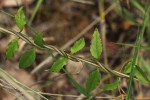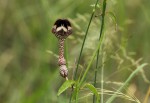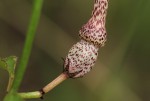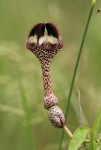Ceropegia nilotica
Selected images: Click on each image to see a larger version and details of the record View all images (18)
Detailed records: Display species records QDS maps by: Google Maps Point records by Google Maps
Species details: Click on each item to see an explanation of that item (Note: opens a new window)
| Synonyms: |
Ceropegia boussingaultiflora Dinter Ceropegia constricta N.E. Br. Ceropegia grandis E.A. Bruce Ceropegia mozambicensis Schltr. Ceropegia nilotica Kotschy var. nilotica Ceropegia plicata E.A. Bruce |
| Common names: | Nile ceropegia (English) White-banded ceropegia (English) |
| Frequency: | |
| Status: | Native |
| Description: |
Perennial twining herb with annual sparsely branched stems, up to 2 m long, growing from a cluster of fusiform succulent roots. Milky sap present. Leaves opposite, broadly ovate-lanceolate, up to c. 8 × 6 cm, somewhat fleshy, hairless; petiole c. 1 cm. Flowers in 1-several-flowered axillary inflorescences. Corolla 3.5-5 cm long; tube slightly curved, swollen at the base with a constriction in the middle of the swollen part, pale coloured with a purplish tinge, heavily marked dark purple on the widening upper third towards the lobes, connecting at the tips to form a "cage", dark purple and hairy on the inside with yellow spots near the base. Corona with outer lobes forming 5 pockets with entire margins; inner lobes linear, more or less recurved. |
| Type location: |
South Sudan |
| Notes: | A variable species. The shape of the tube is characteristic and the markings are fairy constant although the tips of the corolla lobes vary from green to black. |
| Derivation of specific name: | nilotica: from the valley of the Nile |
| Habitat: | In mopane and mixed deciduous woodland |
| Altitude range: (metres) | Up to 1350 m |
| Flowering time: | Dec - Feb |
| Worldwide distribution: | Widespread in tropical Africa extending to KwaZulu-Natal South Africa. |
| FZ divisions: | N,W,E,S |
| Growth form(s): | |
| Endemic status: | |
| Red data list status: | |
| Insects associated with this species: | |
| Spot characters: | Display spot characters for this species |
| Images last updated: | Saturday 20 February 2016 |
| Literature: |
Bolnick, D. (2007). A Guide to the Common Wild Flowers of Zambia and Neighbouring Regions Revised Edition. WECS, Lusaka, Zambia Bruyns, P.V. (2014). The Apocynaceae of Namibia Strelitzia 34 SANBI, Pretoria, South Africa Pages 89 - 90. Chapano, C. & Mamuto, M. (2003). Plants of the Chimanimani District National Herbarium and Botanic Garden, Zimbabwe Page 12. Dyer, R.A. (1983). Ceropegia, Brachystelma and Riocreuxia in Southern Africa. Balkema Golding, J.S. (ed.) (2002). Namibia Plant Red Data List. Southern African Plant Red Data Lists. SABONET 14 Page 74. Goyder, D.J., Gilbert, M.G. & Venter, H.J.T. (2020). Apocynaceae (Part 2) Flora Zambesiaca 7(2) Pages 142 - 147. (Includes a picture). Mapaura, A. & Timberlake, J. (eds) (2004). A checklist of Zimbabwean vascular plants Southern African Botanical Diversity Network Report No. 33 Sabonet, Pretoria and Harare Page 20. as Ceropegia nilotica var. nilotica Ntore, S. & al. (2024). Checklist of the vascular plants of Burundi Page 51. Plowes, D.C.H. & Drummond, R.B. (1990). Wild Flowers of Zimbabwe. Revised edition. Longman, Zimbabwe. No. 93, plate 127 Setshogo, M.P. (2005). Preliminary checklist of the plants of Botswana. Sabonet Report no. 37. Sabonet, Pretoria and Gaborone Page 25. Timberlake, J.R. & Childes, S.L. (2004). Biodiversity of the Four Corners Area: Technical Reviews Volume Two (Chapter 5-15) Appendix 5-1: Plant Checklist Occasional Publications in Biodiversity 15 Page 197. |
Other sources of information about Ceropegia nilotica:
Our websites:
Flora of Botswana: Ceropegia niloticaFlora of Burundi: Ceropegia nilotica
Flora of Caprivi: Ceropegia nilotica
Flora of Malawi: Ceropegia nilotica
Flora of Mozambique: Ceropegia nilotica
Flora of Zambia: Ceropegia nilotica
External websites:
African Plants: A Photo Guide (Senckenberg): Ceropegia niloticaAfrican Plant Database: Ceropegia nilotica
BHL (Biodiversity Heritage Library): Ceropegia nilotica
EOL (Encyclopedia of Life): Ceropegia nilotica
GBIF (Global Biodiversity Information Facility): Ceropegia nilotica
Google: Web - Images - Scholar
iNaturalist: Ceropegia nilotica
IPNI (International Plant Names Index): Ceropegia nilotica
JSTOR Plant Science: Ceropegia nilotica
Mansfeld World Database of Agricultural and Horticultural Crops: Ceropegia nilotica
Plants of the World Online: Ceropegia nilotica
Tropicos: Ceropegia nilotica
Wikipedia: Ceropegia nilotica




